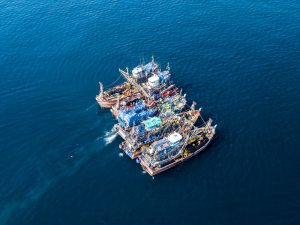
U.S. Sen. Roger Wicker (R-MS), a member of the U.S. Senate Commerce, Science, and Transportation Committee, earlier this week questioned whether increased federal action would aide in the halt of illegal fishing and seafood trade in the global marketplace.
Sen. Wicker on Aug. 28 introduced the bipartisan Maritime Security And Fisheries Enforcement (SAFE) Act, S. 3400, to address the threat to national security from illegal, unreported and unregulated (IUU) fishing and associated illegal activity, to prevent the illegal trade of seafood and seafood products, among other purposes, according to the text of the bill.
S. 3400 calls for “a whole-of-government approach” that would include the intelligence community to help combat IUU fishing, Sen. Wicker said during the Sept. 18 hearing held by the U.S. Senate Commerce Subcommittee on Oceans, Atmosphere, Fisheries, and the Coast Guard to examine the impacts of crime and other conflicts in global fisheries.
“Are we on to something here?” Sen. Wicker asked witness Paul Doremus, deputy assistant administrator for operations within the National Oceanic and Atmospheric Administration’s (NOAA) National Marine Fisheries Service in the U.S. Commerce Department.
“Would it help to be more all-inclusive?” the senator asked. “And would it specifically help to include the intelligence community in this effort?”
The Trump administration is currently reviewing S. 3400, answered Doremus, who said he couldn’t comment specifically on the proposal.
However, more generally, Doremus said he could discuss actions being undertaken by the 14 federal agencies that have a role in implementing U.S. actions to fight IUU fishing and seafood fraud, both domestically and internationally.
“A whole-of-government approach is an essential ingredient of our ability — long-term — to be able to set and best use the institutional capabilities that we have among the federal government agencies as well as with the regional fishery management organizations and our other government partners around the globe in tackling this problem,” Doremus said.
Interagency coordination on these efforts is managed through an interagency working group on IUU Fishing and Seafood Fraud, co-chaired by NOAA and the State Department, Doremus wrote in his written testimony.
The working group coordinates the implementation of set actions to improve international tools, strengthen enforcement cooperation, enhance partnerships with industry and other stakeholders, and implement a risk-based traceability program for seafood entering U.S. commerce, he wrote.
The National Security Council identified combating IUU fishing as one of the Trump administration’s international environmental priorities under the Combating Conservation Crimes initiative, which Doremus testified calls for NOAA to promote adoption and implementation of global and regional counter-IUU fishing measures, among a variety of actions.
S. 3400 would expand upon such efforts via better interagency collaboration and coordination to address IUU fishing, according to Sen. Wicker’s office.
IUU fishing produces an estimated tens of billions of dollars annually that’s used to fund illicit activities such as drug smuggling and human trafficking, according to Wicker’s staff.
S. 3400 would establish a working group comprised of intelligence community stakeholders appointed by the director of national intelligence, the senator said during the subcommittee hearing.
Sen. Wicker also asked Doremus about U.S. efforts to curb the illegal fishing activity of Mexican crew boats, which operate in U.S. federal waters off the coast of Texas, typically carry drugs up from Mexico into Texas, and then illegally fish with large driftnets on return trips to Mexico. Proceeds from such illegal fishing activities supplement ongoing cartel operations, the lawmaker said.
“We believe we are moving in a very positive direction on this problem,” Doremus said. “It will require sustained effort by all of us.”
Doremus indicated the U.S. government has been working with Mexican officials to develop a plan to stop the illegal fishing of these crews, which can capture up to five times the amount of red snapper allowed to be captured by legal fishermen in Mississippi, according to Sen. Wicker’s office.
Among numerous provisions, S. 3400 also would establish a sub-working group comprised of the State Department, U.S. Coast Guard and NOAA to target the eradication of illegal fishing activities in the Gulf of Mexico.
S. 3400, which is sponsored by U.S. Sen. Chris Coons (D-DE), with Sen. Wicker being the original cosponsor, is under review by the Senate Commerce, Science, and Transportation Committee.



